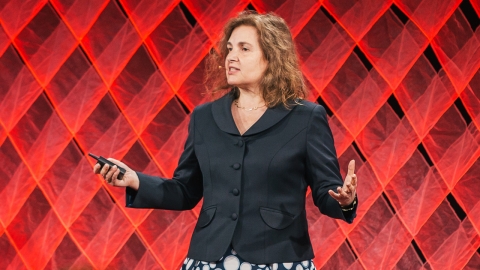Daniela Rus, Director of CSAIL and MIT EECS Professor, recently received the 2025 Edison Medal from the Institute of Electrical and Electronics Engineers (IEEE). The award recognizes her leadership and pioneering work in modern robotics.
The Edison Medal has been handed out almost every year since 1909, honoring the impactful work of electrical engineers like Alexander Graham Bell, Nikola Tesla, George Westinghouse, Vannevar Bush, and more recently Vincent Chan. It’s named after Thomas Edison, who produced the first practical incandescent electric light bulb back in 1879.
Rus now joins this exclusive group, having helped redefine traditional robotic systems by equipping them with machine intelligence that makes sense of the physical world through explainable algorithms. She envisions robots as helpful tools that enhance human strength, precision, and reach to help people solve real-world challenges. Rus also aims to create new tools to design and fabricate robots.
Rus's research aims to develop the science and engineering of autonomy. Working towards a future of integrating robots into the fabric of life, she focuses on groups of robots interacting with each other and with people to support humans with cognitive and physical tasks.
Her research addresses some gaps between where agents, whether embodied or not, are today. Rus’s work also explores the promise of pervasive agents: increasing the ability of machines to reason, learn, and adapt to complex tasks in human-centered environments, developing intuitive interfaces between robots and people, and creating the tools for designing and fabricating new robots quickly and efficiently. The applications of this work are broad and include demonstrations in transportation, manufacturing, agriculture, construction, underwater exploration, smart cities, medicine, monitoring, and in-home tasks such as cooking.
Her far-reaching contributions to robotic intelligence have powered many unique machines. She’s developed modular robotic boats that can self-assemble into bridges and platforms, a tiny ingestible origami robot that can remove dangerous button batteries from children’s digestive systems, and soft robots resembling fish and sea turtles to survey aquatic environments. Rus’s work on robot design expands our notion of robot bodies by introducing a range of new shapes and materials for creating robots.
More recently, she helped invent liquid neural networks, inspired by the simple, yet effective neural system of a tiny worm. By designing algorithms that can operate with as few as 19 neurons, Rus has shown how machines like drones and autonomous vehicles can navigate complex environments with outstanding efficiency.
Last month, Rus earned the 2024 John Scott Award. She’s part of the Class of 2002 MacArthur Fellows and was elected to the National Academy of Engineering and the American Academy of Arts and Sciences. Rus is also a fellow of the Association for Computer Machinery, the Institute of Electrical and Electronics Engineers, and the Association for the Advancement of Artificial Intelligence.



